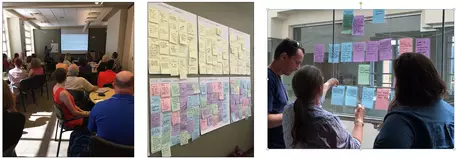Project Overview
A Framework for Transformative Geoscience Education Research
Summary
Fourteen ago the Wingspread Report (Manduca et al., 2003) helped establish geoscience education research (GER) as an important research field and highlighted major research questions for GER at the time. More recently, the growth and interest in GER is evident from the increase in geoscience education research articles, the establishment of the NAGT GER Division, the creation of the GER Toolbox, an increase in GER graduate programs, and the growth of tenure-eligible GER faculty positions. As an emerging DBER field (Singer et al., 2012), the GER community is examining the current state of their research and considering the best course forward so that it can have the greatest collective impact on advancing undergraduate teaching and learning in the geosciences.
As part of an NSF-funded effort to meet this need, 40 researchers drafted priority research questions, or "Grand Challenges", that span 10 geoscience education research themes (Figure 1). For each theme, several Grand Challenges and recommended strategies have been proposed. This draft framework has undergone one round of peer-review and is now ready for the broader community to critically examine. We seek perspectives from geoscience education researchers, scholars, and reflective educators.
Goal
The project goal is to engage the community in setting ambitious goals for geoscience education research (GER) that will be achievable within ten years and will have significant impact on undergraduate geoscience teaching and learning.
Vision
It is our vision that the final outcomes of this community-grounded process will be a published guiding framework to:
- focus future GER on questions of high interest to the geoscience education researcher and practitioner community,
- provide funding agencies with a strong rationale for including GER in future funding priorities,
- increase the strength of evidence of GER community claims, and
- elevate the visibility, stature, and collaborative potential of GER in the geosciences and in STEM education research.
Process
The project involves a year-long process of community engagement (Figure 2).
An initial step in the process was to identify themes that define the spectrum in which GER operates and has the potential to impact undergraduate teaching and learning. The themes were informed by: focus group discussions at the 2015 GER workshop, results from the 2016 and 2017 GER Surveys, the DBER Report (Singer et al., 2012), the Wingspread Report (Manduca et al., 2003), the Earth in Mind II Synthesis report (Kastens and Manduca, 2012), and Lewis and Baker (2010, JRST).
The 2017 GER survey helped provide initial ideas on grand challenges and supplied recommended references on each of the topical areas. The results of the survey were reported to the community in a webinar and informed the summer GER workshop. The primary focus of the 2017 summer GER workshop (Figure 3), the GSA Town Hall, and Working Group efforts since the town hall has been to to articulate and prioritize grand challenges for each theme that are of high interest to the geoscience education researcher and practitioner community, and recommend strategies to address the prioritized grand challenges. The grand challenges are to be articulated as overarching research questions. The strategies should be ones that the community views as providing the strongest opportunities for rapid achievement of transformative GER.

![[creative commons]](/images/creativecommons_16.png)
Currently, the project is undergoing a period of review to get feedback from the community. Comments can be entered in the 'Discussion' box directly on the webpages for each of the ten topical areas of GER. The Open Comment period will end February 12, 2018. Working groups will then use the feedback to revise the chapters. The entire framework will be disseminated to the geoscience community, the geoscience education research community, the broader DBER community and NSF broadly via reports, open access online postings, and manuscripts.
Funding and Project Leadership
This project "A Framework for Transformative Geoscience Education Research" is funded by the National Science Foundation through grant DUE-1708228 to Kristen St. John (James Madison University). She is joined by Kim Kastens (Lamont-Doherty Earth Observatory), Heather Macdonald (College of William and Mary), Karen McNeal (Auburn University), and John McDaris (SERC-Carleton College) for the Project Leadership team. Working Group leaders include Cinzia Cervato (Iowa State University), Kim Kastens (Lamont-Doherty Earth Observatory); Heather Macdonald (College of William and Mary); Karen McNeal (Auburn University); Heather Petcovic (Western Michigan University); Eric Pyle (James Madison University), Eric Riggs, (Texas A7M University); Katherine Ryker (University of South Carolina////), Steve Semken (Arizona State University-Tempe), and Rachel Teasdale (California State University-Chico).
Working Group members include Leilani Arthurs (University of Nebraska at Lincoln); Mary Beck (Valencia College); Prajukti Bhattacharyya (University of Wisconsin-Whitewater); Kelsey Bitting (Northeastern University); Rebecca Boger (CUNY Brooklyn College); James Brey (American Meteorological Society); Caitlin Callahan (Grand Valley State University); Jason Cervenec (Byrd Polar - Ohio State University); LeeAnna Chapman (North Carolina State University); Donna Charlevoix (UNAVCO); Kim Cheek (University of North Florida); Susan Conrad (Dutchess Community College); Robyn Dahl (Western Washington University); Andy Darling (Colorado State University); Ashlee Dere (University of Nebraska at Omaha); Don Duggan-Haas (Paleontological Research Institution); Cory Forbes (University of Nebraska at Lincoln); Anne Gold (University of Colorado at Boulder); Mariana Guereque (University of Texas at El Paso); Lauren Holder (Texas A & M University); Allison Jaeger (Temple University); Hari Kandel (SUNY College at Oneonta); Kaatje Kraft (Whatcom Community College); Zo Kreager (Northern Illinois University); Julie Libarkin (Michigan State University); Cathy Manduca (SERC-Carleton College); Elizabeth Nagy-Shadman (Pasadena City College); Amy Pallant (The Concord Consortium); Deana Pennington (University of Texas at El Paso); Nancy Price (Portland State University); Victor J. Ricchezza (University of South Florida); Hannah Scherer (Virginia Polytechnic Institute and State Univ); Jennifer Wiggen (North Carolina State University).


